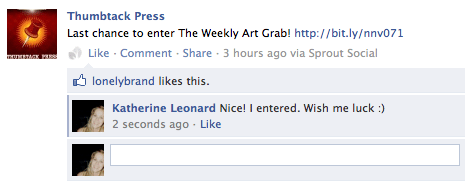
Facebook rolled out some major changes at last week’s F8 conference. And, as predictably as the sun rising, users began voicing their distaste with the latest round of updates to the most widely recognized social network in the world.
But what about us – the marketers? The CMOs of the world too busy to keep up with tweaks and anomalous algorithms that may or may not impact brand interactions? Rumor has it that the age of the ‘like’ is coming to an end, and with it the most straightforward Facebook metric available to marketers. But it’s not the end of the world, we promise. We’ll walk you through the changes you need to know about, how they’ll affect your Facebook strategy and a few tips on how to cope with the most dramatic transition Facebook has made to date.
Likes are like, a little less important.
Users can now comment on a brand’s Facebook page without ‘liking’ it first. This is a big change, but it’s not necessarily negative. Say someone sees a Twitter link to your Facebook content. Now that user no longer has to click over and ‘like’ your page in order to comment on the Facebook post. We would even argue that blocking a non-liker from engaging on your page was a drawback in the first place. As the old saying goes, “One click is better than two.”
Why limit your Facebook vocabulary to ‘like’?
Hey, guess what? Like is not the only verb in the English language. While studies do show that a Facebook like is a valuable commodity, it’s not the Alpha and Omega of social engagement. And with the new Facebook changes, ‘likes’ are bound to be buried by layers of more dynamic social actions.
Focus on getting your users to share an action that is more compelling than a mere virtual thumbs-up. For example, if my network sees that I ‘like’ affordable art website Thumbtack Press, they may or may not be compelled to check it out themselves. But if a brand is smart enough to expand its verb repertoire beyond ‘like,’ my network will be exposed to more interesting social actions like “enter,” “want,” and “eat.” In the example below, I entered a giveaway. When my network sees this, it will stand out because the story is backed up by an action that is more inspiring than a monotonous click of the ‘like’ button.
Content, content, content.
You knew we were going to use the C word in this post right? One of the major changes in Facebook’s platform is the little box in the top left corner of each story that users can click to remove a story from their feed. Facebook then uses this information to automatically edit feeds according to what the user indicates they are interested in. Think about it like this: if you produce boring or irrelevant stories, people are going to check that box in the top left corner, and the visibility of this story and any future stories you produce will inevitably decrease. Yikes.
How can you combat this blow to your brand’s visibility? It’s all about content. If you push your products all day long, your users are going to get bored and go on a upper-left-hand-corner-box checking spree. And there goes your voice. Create stories about things that matter to your reader and you will remain both relevant and visible.
Get by with a little help from (your users’) friends.
The new Facebook focuses on what Mark Zuckerberg calls “social discovery” – a way for users to see what their friends are eating, reading, drinking, listening to, watching…you get the point. This is great news for brands because it is a free and organic way to spread product news and promotions. And who better to take recommendations from than your friends?
If this social discovery concept is something you’re willing to pay for, check out Sponsored Stories, which accelerate the rate at which brand mentions spread.
So if I eat a delicious meal at my favorite sushi joint and post it on Facebook, said sushi joint can buy this story and run it as an ad to people in my network. The idea is that producing an ad out of the story below will be more effective for people in my network because a familiar face is sharing an enjoyable experience.
There are some serious changes in store for Facebook in the next several weeks. Do you think they are positive changes for marketers? Do you feel prepared for the transition?


